
AMERICAN ETHNOLOGIST
Scope & Guideline
Unveiling the Rich Tapestry of Human Experience
Introduction
Aims and Scopes
- Ethnographic Approaches to Global Issues:
The journal emphasizes ethnographic research that explores global challenges, including migration, humanitarian crises, and climate change, providing in-depth analyses of how these issues impact communities. - Critical Engagement with Power Dynamics:
A core focus lies in examining the relationships between power, identity, and social justice, often highlighting the experiences of marginalized groups in various socio-political contexts. - Interdisciplinary Dialogues:
The journal fosters interdisciplinary discussions by incorporating perspectives from sociology, political science, and cultural studies, allowing for a richer understanding of anthropological topics. - Reflections on Methodology:
There is a consistent interest in innovative and reflexive methodologies in ethnography, challenging traditional practices and adapting to contemporary research environments. - Decolonial Perspectives:
The journal actively engages with decolonial frameworks, critiquing colonial legacies within anthropology and promoting indigenous knowledge systems and voices.
Trending and Emerging
- Humanitarianism and Ethics:
A significant trend is the increasing focus on humanitarianism, exploring the ethical implications of aid, volunteerism, and the experiences of displaced populations in crisis situations. - Multispecies and Ecological Perspectives:
Emerging themes include multispecies ethnographies that examine human-animal relations and ecological interdependencies, highlighting the urgency of environmental issues in anthropological research. - Digital Anthropology:
There is a growing interest in digital anthropology, examining the impact of social media and technology on cultural practices, identity formation, and community building in the digital age. - Decolonization and Social Justice:
A robust trend is the exploration of decolonization efforts within anthropology, focusing on social justice movements, indigenous rights, and the re-evaluation of anthropological practices. - Citizenship and Belonging:
The journal is increasingly publishing research that interrogates concepts of citizenship, belonging, and identity in a globalized world, often critiquing state-centric notions of citizenship.
Declining or Waning
- Traditional Cultural Practices:
There appears to be a waning interest in ethnographies that focus solely on traditional cultural practices without engaging with contemporary issues, as the journal increasingly prioritizes studies that connect historical contexts to current socio-political realities. - Methodological Conservatism:
The journal has seen a decline in papers employing conventional ethnographic methods without critical reflection. There is a shift towards more innovative and adaptive methodologies that address the complexities of modern research environments. - Focus on Western-centric Narratives:
Papers that center predominantly on Western experiences or perspectives have become less frequent, as the journal increasingly highlights global south narratives and decolonial approaches.
Similar Journals
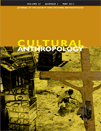
CULTURAL ANTHROPOLOGY
Navigating the Landscape of Cultural UnderstandingCULTURAL ANTHROPOLOGY is a premier journal in the field of anthropology, published by the esteemed SOC CULTURAL ANTHROPOLOGY. With an impressive impact factor and ranking in the Q1 category for both anthropology and arts and humanities, it stands as a leading platform for scholarly discourse and innovative research. Since transitioning to Open Access in 2014, the journal has made substantial contributions to the accessibility of anthropology literature, allowing a broader audience to engage with cutting-edge anthropological insights and findings. The journal's scope encompasses a wide range of cultural studies and anthropological perspectives, catering to a diverse readership that includes researchers, professionals, and students. Published from the Department of Anthropology, Rice University in Houston, Texas, CULTURAL ANTHROPOLOGY continues to shape the conversation in its field, promoting interdisciplinary dialogue and enriching the academic landscape.
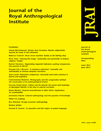
JOURNAL OF THE ROYAL ANTHROPOLOGICAL INSTITUTE
Elevating Research in the Study of HumanityJOURNAL OF THE ROYAL ANTHROPOLOGICAL INSTITUTE, published by Wiley, stands as a prestigious platform for scholarly discourse in the field of anthropology. With an ISSN of 1359-0987 and an E-ISSN of 1467-9655, this journal has been a vital resource for researchers, professionals, and students since its inception, featuring contributions that push the boundaries of understanding in both cultural and social anthropology. The journal’s rigorous peer-review process affirms its high academic standards, reflected in its top-tier Q1 rankings in both the Anthropology and Arts and Humanities categories for 2023. With a current ranking of #78 out of 502 in Social Sciences Anthropology and #138 out of 552 in Miscellaneous Arts and Humanities, it inhabits a critical space within academia, addressing seminal issues and innovative research. While the journal is not open access, it remains accessible to those affiliated with institutions that provide subscriptions, ensuring that groundbreaking anthropological insights are disseminated widely within the academic community. As it converges from 1995 to the present, the JOURNAL OF THE ROYAL ANTHROPOLOGICAL INSTITUTE continues to shape the landscape of anthropological research, engaging a diverse readership eager to explore the intricate tapestry of human cultures.
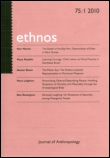
ETHNOS
Exploring the Depths of Culture and SocietyETHNOS is a leading journal published by Routledge Journals, Taylor & Francis Ltd, dedicated to advancing the field of anthropology and archaeology. With an impressive impact factor reflected in its high Scopus rankings—#23 in Archaeology and #44 in Anthropology—the journal is recognized for its rigorous scholarship and its influence on contemporary discussions in social science. Operating since 1936, ETHNOS provides a vital platform for innovative research and theoretical discourse, making it an essential resource for professionals, academics, and students alike. Although it does not offer Open Access, its meticulous editorial standards and Q1 classification in both Anthropology and Archaeology guarantee substantive contributions to the study of culture and society. Located in the United Kingdom, the journal continues to shape the narratives surrounding social and cultural phenomena, enriching the academic landscape up to 2024 and beyond.

Revista de Antropologia Social
Connecting Voices through Innovative ResearchRevista de Antropologia Social, published by the Universidad Complutense de Madrid, is a vital resource in the field of Anthropology, featuring a wide range of research that explores cultural, social, and environmental dimensions from both historical and contemporary perspectives. With an ISSN of 1131-558X and E-ISSN of 1988-2831, this open-access journal has been a platform for scholarly communication since 1991, making high-quality research accessible to a global audience. Ranked in the Q3 quartile of anthropology journals in 2023, it reflects a commitment to promoting diverse voices and innovative methodologies within the discipline. While holding a Scopus rank of #339 out of 502 in Social Sciences - Anthropology, this journal stands out not only for its scholarly contributions but also for fostering interdisciplinary dialogue. Researchers, professionals, and students alike can benefit from its robust repository of articles, enriching their understanding of anthropological concepts and practices in the modern academic landscape.

Lusotopie
Cultivating Insight into Lusophone Heritage and IdentityLusotopie is a distinguished academic journal dedicated to the exploration of cultural, social, and political dynamics in Lusophone societies, providing a pivotal platform for researchers and scholars in the fields of anthropology, history, and cultural studies. Published by Lusotopie, the journal features contributions that foster a deeper understanding of the linguistic, historical, and cultural connections across Portuguese-speaking communities, making it an essential resource for academics and professionals alike. With its ISSN 1257-0273 and E-ISSN 1768-3084, the journal aims to bridge interdisciplinary gaps while promoting critical discourse in the study of Lusophone regions. Although Lusotopie does not operate under an open access model, it remains committed to enhancing scholarly dialogue and disseminating significant research findings. The journal has cultivated a reputation for publishing quality articles, researched during its active years since 1999, thereby securing its place as an important contributor to the academic landscape of Mediterranean studies. Researchers, professionals, and students interested in the cultural intricacies and sociopolitical issues facing the Lusophone world will find Lusotopie an invaluable resource.
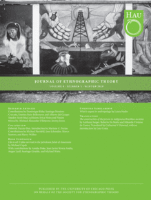
HAU-Journal of Ethnographic Theory
Unveiling the Complexity of Cultures through Rigorous Ethnographic Theory.HAU-Journal of Ethnographic Theory, published by University of Chicago Press, stands as a leading platform for scholarly discourse in the field of anthropology. Established in 2011, this esteemed journal focuses on ethnographic methodologies and theoretical advancements, offering a significant contribution to the understanding of human cultures and social practices. With an impressive Q2 ranking in anthropology and a strong placement in the 63rd percentile among peers in the Scopus rankings, HAU ensures high visibility and impact within the academic community. Although the journal currently does not offer open access, it is widely available for institutions, fostering a global dialogue among researchers, professionals, and students. As it converges its content towards 2024, HAU remains dedicated to publishing innovative research that challenges existing paradigms and encourages critical reflection, solidifying its importance in the continuous evolution of ethnographic theory.
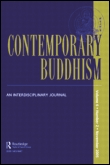
Contemporary Buddhism
Advancing Scholarship on Buddhism in a Global ContextContemporary Buddhism is a leading academic journal published by Routledge Journals, Taylor & Francis Ltd, focusing on pivotal issues in the realms of various Buddhist studies, philosophy, and religious discourse. With an impressive impact factor that reflects its prestige, this journal has achieved a Q2 ranking in both Philosophy and Religious Studies categories as of 2023, highlighting its significant contribution to academic conversations. Covering the years from 2010 to 2023, it prominently features interdisciplinary scholarship that addresses contemporary challenges facing Buddhist societies and cultures worldwide. Researchers and practitioners can access essential articles that engage with traditional and modern interpretations of Buddhism. As a critical resource for scholars and students alike, Contemporary Buddhism fosters a deeper understanding of the dynamic interactions between Buddhism and contemporary societal changes in a global context.
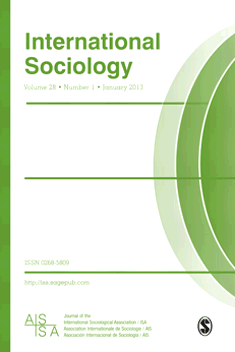
INTERNATIONAL SOCIOLOGY
Pioneering research that shapes the future of sociology.INTERNATIONAL SOCIOLOGY, published by SAGE Publications Ltd, is a prestigious academic journal dedicated to advancing the field of sociology and political science. With an ISSN of 0268-5809 and E-ISSN 1461-7242, the journal is recognized for its high-quality research, boasting an impressive 2023 ranking in the top Q1 category, placing it within the upper 15% of its field. Its Scopus ranking of #235 out of 1466 signifies a strong presence in academic circles, reflected in its 84th percentile. A significant repository of knowledge, INTERNATIONAL SOCIOLOGY covers a wide array of topics related to social structures, cultural dynamics, and political influences across diverse contexts. Operating from the United Kingdom, the journal has been disseminating scholarly work since 1986, ensuring that it remains a critical platform for sociologists, political scientists, and interdisciplinary researchers. Through insightful articles and rigorous peer-review processes, it aims to foster discussions that challenge and redefine contemporary understandings of society, making it essential reading for academics and practitioners alike.

Journal of Political Power
Unraveling the Threads of Political PowerWelcome to the Journal of Political Power, a leading academic platform devoted to the nuanced exploration of power dynamics within political frameworks. Published by Routledge Journals, Taylor & Francis Ltd, this esteemed journal has been at the forefront of political science research since its inception in 2008, indexing notable works and championing scholarly discourse through 2024. With an impressive Q1 category ranking in both Sociology and Political Science, the journal offers vital insights and innovative analyses of political structures and behaviors, making it an essential resource for researchers, professionals, and students alike. The journal is recognized for its significant contributions to the understanding of power relations and governance, as reflected in its strong Scopus rank of #242 out of 1466 in the Social Sciences category, placing it in the 83rd percentile. Although it operates on a traditional access model, the quality and impact of its publications ensure that the Journal of Political Power remains indispensable for anyone invested in the discourse surrounding political authority and community dynamics.

COMPARATIVE SOCIOLOGY
Connecting theory with practice in global sociology.COMPARATIVE SOCIOLOGY, published by BRILL in the Netherlands, serves as a pivotal platform for researchers and scholars in the fields of sociology and political science. With an ISSN of 1569-1322 and E-ISSN 1569-1330, this journal has established a focus on comparative analyses that enhance our understanding of social dynamics across diverse cultures and political systems. Although currently not Open Access, it remains accessible to academic institutions and individuals committed to advancing sociological inquiry. Recognized in the 2023 category quartiles as Q3 in Sociology and Political Science, COMPARATIVE SOCIOLOGY ranks 866th out of 1466 journals in its field, indicating a growing influence among contemporary scholarly dialogues. Spanning contributions from 1970 and continuing to the present, the journal aims to bridge theoretical insights with empirical research, offering a comprehensive resource for students, professionals, and academics dedicated to the nuanced study of societal structures and transformations. Join a community of thought leaders and engage with innovative ideas that challenge conventional understandings in this vital area of social research.